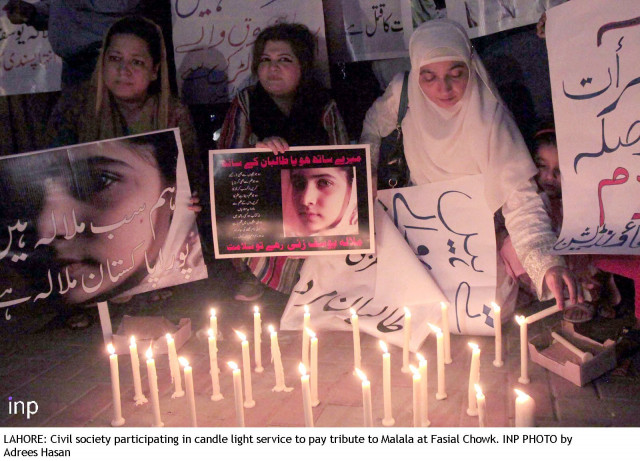Will Malala unite us against terror?
Let's hope that Pakistan will fight its war against terror as its own war because there is no other way forward.

On October 11, the military top brass got together with the government to express its solidarity over yet another incident of soul-searing intensity in the name of Islam. The military declared that “it is ready for any sacrifice for eliminating terrorism” and members of the meeting chaired by President Asif Ali Zardari on the civilian side declared that they were satisfied “ with the standard of preparedness of the armed forces to take on the upcoming challenges faced by the country”. Once again, members resolved “to fight the menace of terrorism”.
Army chief General Ashfaq Parvez Kayani, in fact, needed to be supported in his earlier resolve expressed on August 14 that the war against terrorism and extremism was the real war confronting the nation and that it was a war to be fought by Pakistan. He was present in the meeting and must have felt that he was not alone in his thinking although most actions taken by Pakistan in the realm of foreign policy indicated that Pakistan was no longer interested in fighting terrorism. His address in Kakul sparked controversy because it was seen as a break from an earlier policy of causing internal agitation through the Difa-e-Pakistan Council.
The resistance to calling a spade a spade is still there and it has followed a pattern since 2009, when another teenage girl was flogged by Taliban hooligans in Swat and the spectacle of the nation’s shame was shown all over the world through a videotape. President Zardari ‘ordered inquiry’ and the chief justice took his suo-motu notice, followed by parliament passing a resolution. The army, which had been a spectator for some time, finally acted and drove the Taliban out of Swat-Malakand in an operation that displaced three million people. In 2009, there was resistance from some quarters to accepting that the Taliban were a negative element under the dubious leadership of Sufi Muhammad and his son-in-law Maulana Fazlullah.
In 2012, too, there is hesitation among some elements to accepting the stark reality of what is being done to the people of Pakistan. Popular clerical leaders of one side link the Malala incident with America’s transgressions in Afghanistan and are not allowing their rage about the American blaspheming film to ebb in favour of realism. Even after nearly a month of violence and destruction of property in the country, the extremists among us are not in the mood to stand on the side of a clearly upset nation. Like 2009, it is the Sunni Council of the Barelvi ulema that has clearly given the call to oppose and defeat the Taliban. But the others are hesitant — either out of fear or out of furtive agreement with the Taliban that Pakistan has to be bent forcibly to accept a religious order which finds no favour with the people.
The army chief has asked after Malala as she lies struggling against a bullet fired into her head. However, in 2009, too, he had looked good making common cause with parliament against the Taliban. In the intervening years, the military fought half-battles at best against the Taliban in Swat, Bajaur, Mohmand, Orakzai and South Waziristan; they were half-battles because the military seemed to be fighting bigger ones against the government since it got the Kerry-Lugar aid from America and because of the memogate case. At a time when Pakistan needed global support, such diversions only made things more difficult for it. Let us hope that this time Pakistan will fight its war against terror as its own war because there is no other way forward.
Published in The Express Tribune, October 13th, 2012.















COMMENTS
Comments are moderated and generally will be posted if they are on-topic and not abusive.
For more information, please see our Comments FAQ